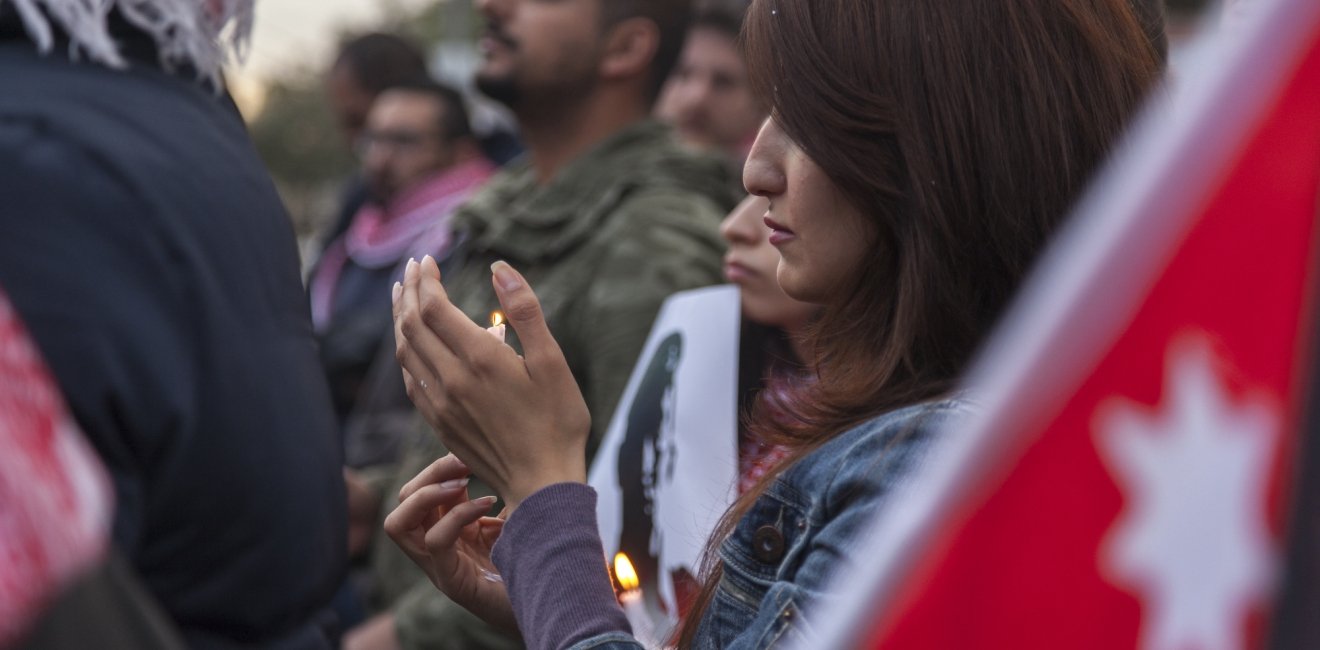
A blog of the Middle East Women's Initiative
After 20 years of activism, the law changed in Jordan. People’s old mentality and acceptance of murders, and weak judicial punishment, began to gradually change.
For around 30 years, I have been an activist and journalist covering gender-based violence (GBV), especially so-called “honor murders,” for The Jordan Times. When I began to report on this topic in 1994, people were skeptical about my coverage, with some stating, “Nothing will ever change in this country.” Others believed that my reports would not have the necessary impact to raise awareness and make a difference given our audience was mainly English speakers. Also, local media at the time shied away from reporting about such murders because, “This was a family matter or a story not worth covering.”
However, I strongly believe in publishing reports after reports about so-called honor killings and other forms of abuse practiced against women and children in my country. Only a small circle, including my family, believed in what I was doing and supported my work. To me, documentation of honor murders through media could be a powerful tool to ignite change.
I wanted to be their voice and tell the whole world who these women were. I wanted to share their ambitions in life before it was cut short, usually by a male relative because they allegedly “sullied their family’s honor,” or were victims of a sexual assault, rumors, or suspicion. In some cases, these women were killed for financial and inheritance reasons. While reporting about these murders, I came to the bitter realization that the justice system also winked at killers. Perpetrators would get a slap on the wrist with prison terms as short as three months to one year for killing one or more female relatives.
A long legacy of violence against women
I also had a great interest in tracing the root causes of these crimes. Violence against women has been documented throughout history. Most of the ancient civilizations—among them the Assyrian, Roman, Manu, Babylonian, and Sumerian—had penal codes that condemned “women adulterers and their partners,” but allowed men to publicly have mistresses with little or no punishment at all.
Matthew A. Goldstein, a historian who has studied honor killings in the Roman Empire, stated that the root of such murders—and the concept of “honor” itself—was men’s desire to control women’s bodies to ensure the children their wives bore were in fact their own. According to the late Egyptian activist and feminist Nawal el-Saadawi, in the mid-15th century, murdering, burning, and making accusations of sorcery against women was all common practice.
More recently, 2017 figures on GBV published by the UN Office on Drugs and Crime indicated a total of 87,000 women were intentionally killed that year, including 50,000 who were killed by intimate partners or family members. In other words, every day 137 women across the globe are killed by a member of their own family. Figures from the UN Population Fund from the year 2000 indicate more than 5,000 women are killed annually for reasons related to “family honor,” although experts estimated the number to be much higher, even back then.
Back home in Jordan, I found that some “honor” killings were not reported at all or were classified as suicide or accidents. Given many in our society back then believed women deserve to be killed and a killer should not spend time behind bars, it was a hard task to report such murders.
Change comes to Jordan
But soon afterward, the Arabic media picked up on the topic and began covering these murders, as well as shedding light on the work of activists, law-enforcement officials, country leaders, and women’s groups. Columnists also began to reflect on the brutality of the murders and praising the activists’ work as well. Unfortunately, others accused them of being “Western and Zionist agents” whose aim was to destroy the morals of women and their families.
The extensive media coverage created awareness among the public about these women victims and the murders. After 20 years of activism, the law changed in Jordan. People’s old mentality and acceptance of murders, and weak judicial punishment, began to gradually change.
The government also introduced new services for women, such as opening shelters for abused women and children and whose lives are in danger for reasons related to family honor. But most importantly, with the media’s force and extensive work by activists and women groups, the Jordanian government admitted there is a serious problem related to GBV that needs to be addressed.
When you reach this point with the government, it becomes their responsibility to secure women and children’s safety and well-being. And this is what ended up happening. Such changes always give me hope that “things can change in this country,” but we need to work hard and be consistent.
Author


Middle East Program
The Wilson Center’s Middle East Program serves as a crucial resource for the policymaking community and beyond, providing analyses and research that helps inform US foreign policymaking, stimulates public debate, and expands knowledge about issues in the wider Middle East and North Africa (MENA) region. Read more


Middle East Women's Initiative
The Middle East Women's Initiative (MEWI) promotes the empowerment of women in the region through an open and inclusive dialogue with women leaders from the Middle East and continuous research. Read more

Explore More in Enheduanna
Browse Enheduanna
Women are the Catalysts for Change in Lebanon

How Education Can Empower Young Women in MENA


